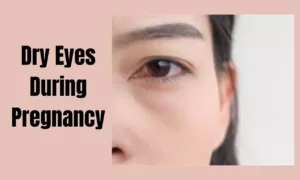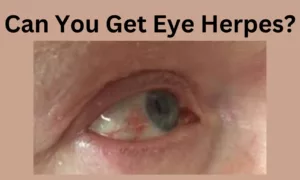How allergies affect your vision? How long is pink eye contagious. These are the few major questions that you probably want to explore. Well, Our eyes are as most sensitive parts of the body as the rest of the whole human body is vulnerable alike. We’re all imperiled to save our eyes from allergic reactions, in the same way, we’re hurried to cure any other emergency illness. This is an agreed-upon phenomenon that few things are more irritating than red, itchy, watery, burning, and puffy eyes. Moreover, as health health-conscious citizen of the world, you’ve to know about how allergies affect your vision. As known allergies are connected with symptoms like sneezing, runny nose, and itchy skin.
However, many people are amazed to learn that allergies have a significant impact on their vision too. When the man was introduced to the most intricate connection between the eyes and the immune system it revealed that allergens can lead to a range of eye-related issues. In this article, we will try our best to explore how allergies affect your vision and what you should do to cure it.
Connection between allergies and eye health
First of all it is mandatory to comprehend the cause of Allergies. It only happens when the immune system reacts to substances that are generally harmful. Additionally, when allergens come into contact with the eyes, they can activate as immune-responsive results in various eye-related problems. Though the eyes are specifically vulnerable to allergens they get exposed and become sensitive.
Types of eye allergies
- Seasonal allergic conjunctivitis: This type of Allergy is often referred to as hay fever and it is triggered by pollen from trees, grasses, and weeds. Symptoms emerged during specific seasons.
- Persistent allergic conjunctivitis: This type of allergy is different from the above It happens around the year that caused by indoor allergens such as dust mites, pet dander, and mold.
- Contact allergic conjunctivitis: This type of allergy is a reaction to substances and happens with direct contact with the eyes, such as eye drops, makeup, or contact lens solutions.
How to get relieve from the conjunctivitis ?
- Avoidance: Firstly it is crucial to categorize and then avoid allergens that cause your eye symptoms. Always try to remain in a closed atmosphere during high pollen seasons, use allergen-proof bedding, and maintain sound indoor air quality.
- Lubricating tears: Your eyes must lubricate so use drops to cure dryness and irritation caused by allergies.
- Cold compresses: Cold compresses are needed to apply to your eyes helping reduce swelling and inflammation.
- Medications: OTC or prescribed antihistamine eye drops and oral antihistamines are best for controlling allergic reactions.
- Consultation with a doctor: If your symptoms persist it becomes mandatory to consult an ophthalmologist or allergist for a proper diagnosis and cure it.
Connection Between Respiratory Indications, Allergies & Contagious Pink Eye
Respiratory symptoms are the major reasons associated with occurring allergies and contagious pink eye. Likewise, they have a significant impact on your vision. For staying comfortable it is vital to keep your eyes pleased and never let them be Itchy, red, or watery, It not only causes discomfort as well as it restricts your daily routine.
What happened to untreated eye allergies?
This becomes so intricate and can lead high risk of eye infections that could be incurable too. Ignoring or disregarding eye allergy symptoms is not only an easy evasion but sometimes it contributes to major conjunctivitis commonly known as “pink eye” which is most contagious and needs ultra-medical treatment. Moreover, persistent itching and rubbing of the eyes and constant friction also worsen inflammation and the symptoms get intensified. Untreated eye allergies lead to chronic disorders.
How to prevent eye allergies?
Many measures should be taken to manage eye allergies to prevent eye allergies.
- Clean & hygienic: It is vital to keep clean and hygienic your living place to lessen indoor allergens like dust mites, mold, and pet dander. Vacuum and dust should be frequently purifiers and wash your bedding all day & night.
- Observe pollen levels: This is crucial to stay informed about pollen counts in your area during allergy seasons. It will be good to limit your routine on days of high pollen levels, keep closed windows of your home, and safely enter your home.
- Use sunglasses: This is wonderful to wear sunglasses during outdoor activities. It will help to shield your eyes from pollen and other allergens.
- Prevent eye rubbing: Eye rubbing is many times inviting, your hands automatically go to your eyes but this rubbing can worsen irritation and increase dirt and germs in your eyes. This can cause a high risk of eye infections.
- Contact lens cleanliness: If you wear contact lenses you should follow proper hygiene instructions. Clean and replace your lenses according to the recommendations of an eye care professional.
- Consult an allergist: Some specific allergens must need to consult an allergist. It will ascertain your proper cure and help to identify the specific infection.
How long is pink eye contagious?
Pink eye, also called conjunctivitis that caused by various influences such as viruses, bacteria, and allergens. The contagiousness of pink eye is counting on some basic reasons.
- Viral conjunctivitis: Viral pink eye can cause the same viruses which become the object of cold or other upper respiratory infections. It is considered highly contagious spreading through direct contact with the infected person’s eye secretions or by the touch of surfaces that have already been contaminated.
Well, how long is viral pink eye contagious is the major question. Thus, the viral pink eye is subject to eye discharge and stays at least for two weeks or maybe even longer in some cases.
- Bacterial conjunctivitis: The reason for Bacterial pink eye is bacteria, the same bacteria become the cause of this conjunctivitis that is responsible for many other types of infections, such as streptococcus or staphylococcus. This may be transmitted through direct contact with eye secretions or contaminated objects. Bacterial conjunctivitis stayed about 24 to 48 hours after starting antibiotic cure. it may be deadly contagious without treatment.
- Allergic conjunctivitis: This type of allergic pink eye is not caused by a virus or bacteria. However, it becomes painful and causes redness, itching, and tearing. Allergic conjunctivitis happens when the eyes come into contact with allergens, such as pollen, pet dander, or dust lice.
How to prevent contagious pink eye?
There are some important notes to prevent Pink eye contagious and to practice safe hygiene:
- Regularly wash your hands after touching your eyes or face.
- Never touch your eyes with unwashed hands.
- Always use separate towels, pillowcases, and other personal items.
- If you become a victim of pink eye start working from home, schooling, or any other workout until the treatment period has passed.
- Never use contact lenses and eye makeup to prevent a decreasing condition and avoid spreading it.
Final Thoughts
Hence, we have discussed the major query related to the contagious pink eye and the fact of whether the allergies affect your vision or not. Well, with thorough research, we came to the point that, yes, the allergies affect your vision in some aspect, while the pink eye can be really contagious. Thus, it’s necessary to take care of all your allergies and pink eye by applying a few precautions before or by implementing a few treatment processes to make them better later on.
FAQ’s
Can allergies indeed affect my vision?
Yes, allergies affect your vision. When your body’s immunity response and allergens occur due to various reasons it causes inflammation, irritation and allergic reactions. Equally, it leads to blurry vision along with other eye condition issues.
How long is pink eye contagious after starting drops or antibiotics?
The pink eye won’t be contagious once you have started taking any antibiotics or treatment. It is expected that within 24 to 48 hrs it will no longer be contagious.
What is allergic conjunctivitis?
Allergic conjunctivitis is an inflammation of the conjunctiva, it becomes a thin layer of tissue to cover the front and inside of your eye. When allergens engage with the conjunctiva your immune system releases histamines and other chemicals that become the reason for flow to the blood vessels in the eye and create symptoms like redness, itching, and watering of the eyes. These elements cause temporary blurry vision but can be converted into serious conditions as well.





